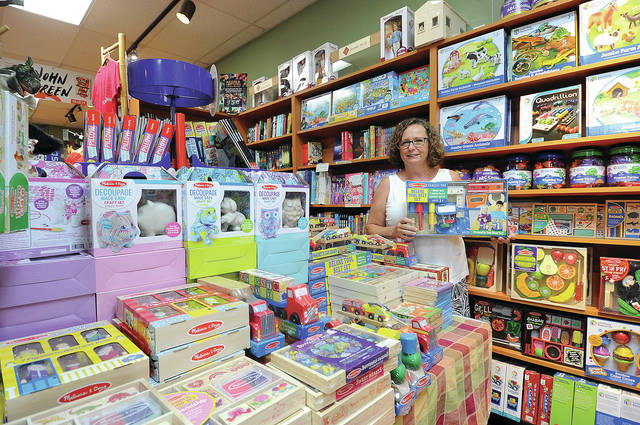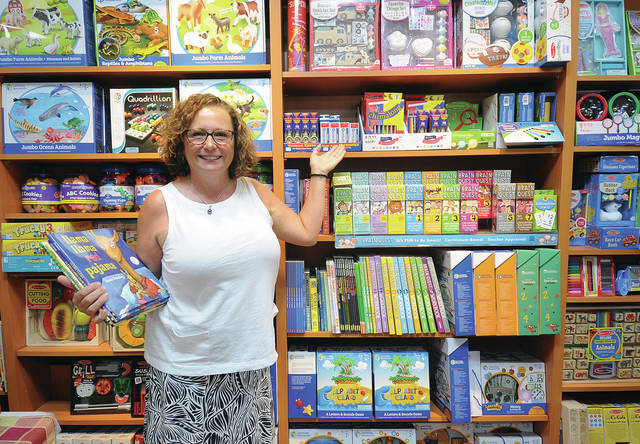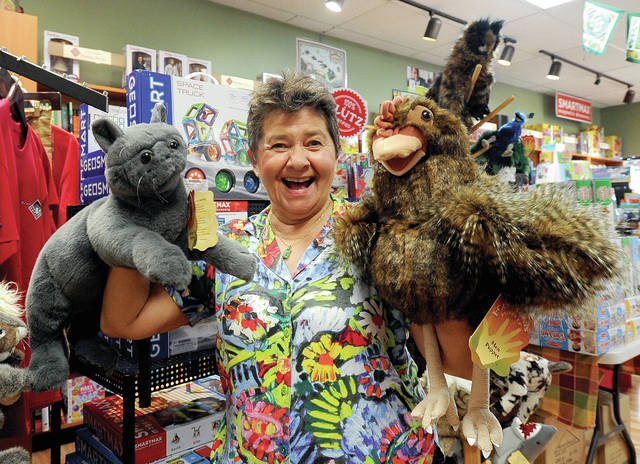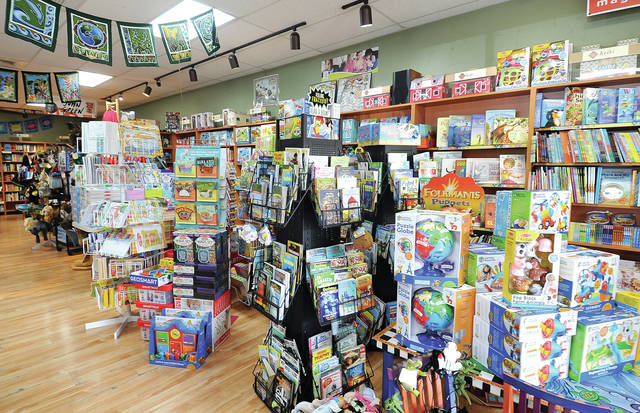Column: Shop small on Small Business Saturday


Brenda McConnell displays educational children’s gifts at Kona Stories Book Store in the Keauhou Shopping Center. The shop, along with other West Hawaii merchants, will participate in Small Business Saturday. (Photos by Laura Ruminski/West Hawaii Today)

Joy Vogelgesang shows off the popular puppets available at Kona Stories Book Store.

Kona Stories Book Store carries local items.

Kona Stories Book Store is one of the shops in West Hawaii participating in Small Business Saturday. (Laura Ruminski/West Hawaii Today)
You probably have heard it before, but here it is again: Small business is Hawaii’s business.
You probably have heard it before, but here it is again: Small business is Hawaii’s business.
There are 129,817 businesses in Hawaii (2015 Census data); 81 percent of these have no employees. Of the remaining 25,110 businesses with employees, 99 percent of them have fewer than 500 employees, 94 percent have fewer than 100, and the vast majority of these have fewer than 20 employees.
If you drill down into these figures for Hawaii County, 96 percent of our island’s businesses with employees have staffs of fewer than 500, 89 percent have fewer than 100, and 79 percent have fewer than 20 employees. All these figures equate to one important fact: Most of us on the Big Island work for small businesses. The Big Island, in fact, has the largest employment sector in the state working for businesses with fewer than 500 employees.
What makes a business “small” by Small Business Administration standards varies by industry, but in 2015 businesses with less than 500 employees in Hawaii County employed almost 32,000 people and accounted for over $1 billion in payroll. This brings the concerns of small businesses down to a very personal level, as what happens to small businesses directly affects the livelihoods of most of us, and it’s the economic fuel that sustains us.
Small business is also, in the aggregate, big business in terms of revenue. Those dollars spent on shoes, oil changes, restaurant meals, and birthday gifts, while not huge individual purchases, add up to total most of the daily spending that most people do.
It’s to acknowledge that and to energize that spending and the impacts it makes on local communities across the country that American Express started “Small Business Saturday” back in 2010. Surveys the company has conducted reveal that $85 billion in sales were spent by consumers who were aware of the Small Business Saturday promotion at small businesses nationwide on the eight Saturdays since the inception of the event in 2010. And here comes the ninth Small Business Saturday on Nov. 24! Ka-ching!
As we all know, the days after Thanksgiving mark the beginning of the holiday shopping season, with the seriously shopping-impaired lining up outside stores on Thanksgiving evening itself and with the busiest shopping day of the year, Black Friday, dawning the very next morning, bright and early, along with all those early bird specials.
Here’s a little bit of trivia for you. This tradition of a holiday shopping “season” started in the late 19th and early 20th centuries when many of the large department stores sponsored Thanksgiving Day parades which were used to launch those stores’ big holiday advertising campaigns.
The now quaint-sounding, unwritten rule among the stores was that no holiday season advertising would be done before the parades were over. That didn’t give the stores enough time, according to some in the retail industry, so, for this reason, Thanksgiving was changed from the last Thursday in November to the fourth Thursday in November in 1939 by Franklin Roosevelt, a proclamation that was passed into law in 1941. Not much of a change, but it does add one more week before Christmas in many years like it does this year.
American Express piggy-backed on the tradition of Black Friday with Small Business Saturday and branded that with the “Shop Small” tagline. In doing so, it wanted to encourage people to frequent the smaller establishments that are the lifeblood of community to support individual entrepreneurship and retail diversity. The results of that are cited in a statistic coming from an online survey where 90 percent of consumers surveyed confirmed that Small Business Saturday has had a positive impact on their communities.
Small Business Saturday is publicized by local neighborhood champions and by local business organizations, including the Small Business Development Center, who recruit small businesses to participate in promoting the day and provide promotional materials supplied by American Express. There are several of these neighborhood champions in Kona, and you’ll see the materials they distribute in the form of signs and banners and shopping bags at local participating retailers.
West Hawaii Today is also running a special promotional advertising section to promote the concept.
Sales to any local merchant help maintain the local community in terms of the payroll they support. Sales to local small businesses support not only payrolls but also the profits of those local companies and keep more of that money in the community. Be a part of supporting West Hawaii by keeping your shopping close to home this holiday season and support Small Business Saturday. Think about “shopping small!”
Dennis Boyd is the director of the West Hawaii Small Business Development Center, which is funded in part through the U.S. Small Business Administration and the University of Hawaii at Hilo.



1. Do you want (insert small business name) to be here when you need them? If so, you should patronize them when you don’t need them.
2. If you own or work for a small business and you want others to patronize it, you need to buy local as well. Do as you want others to do.
3. How much of your money do you want to stay in your community? Chains and big box retailers keep very little of your money in the community, other the cost of paying their workers. They seldom procure anything locally. For every dollar you spend at these places, probably 70%+ leaves the island. Buy local and (depending on the product or service) 70%+ will stay here. Buy online and 100% of your money has left your community.
4. Do you want your children, friends, neighbors or yourself to have the chance to own a business and make a living in Hawaii? Buy local and create a community that supports innovation and entrepreneurship.